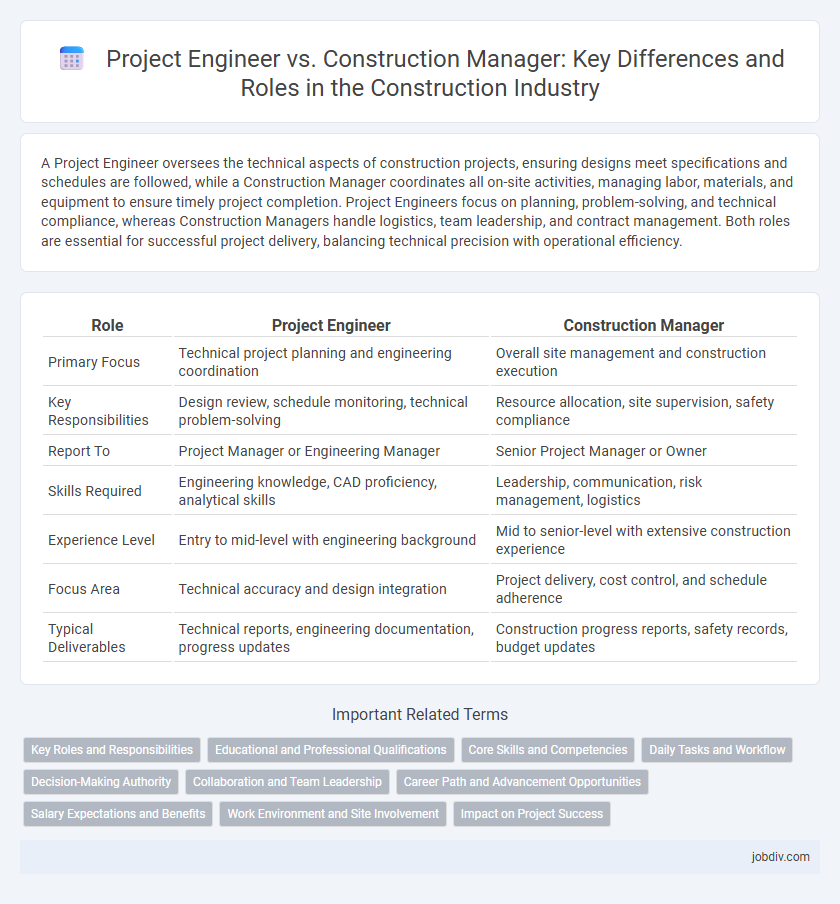A Project Engineer oversees the technical aspects of construction projects, ensuring designs meet specifications and schedules are followed, while a Construction Manager coordinates all on-site activities, managing labor, materials, and equipment to ensure timely project completion. Project Engineers focus on planning, problem-solving, and technical compliance, whereas Construction Managers handle logistics, team leadership, and contract management. Both roles are essential for successful project delivery, balancing technical precision with operational efficiency.
Table of Comparison
| Role | Project Engineer | Construction Manager |
|---|---|---|
| Primary Focus | Technical project planning and engineering coordination | Overall site management and construction execution |
| Key Responsibilities | Design review, schedule monitoring, technical problem-solving | Resource allocation, site supervision, safety compliance |
| Report To | Project Manager or Engineering Manager | Senior Project Manager or Owner |
| Skills Required | Engineering knowledge, CAD proficiency, analytical skills | Leadership, communication, risk management, logistics |
| Experience Level | Entry to mid-level with engineering background | Mid to senior-level with extensive construction experience |
| Focus Area | Technical accuracy and design integration | Project delivery, cost control, and schedule adherence |
| Typical Deliverables | Technical reports, engineering documentation, progress updates | Construction progress reports, safety records, budget updates |
Key Roles and Responsibilities
Project Engineers oversee technical aspects, coordinate engineering tasks, and ensure design specifications meet project requirements. Construction Managers direct on-site operations, manage labor and materials, and maintain project timelines and budgets. Both roles require collaboration to align engineering precision with construction execution for successful project delivery.
Educational and Professional Qualifications
Project engineers typically hold a bachelor's degree in civil, construction, or architectural engineering, emphasizing technical knowledge and design principles, while construction managers often possess a degree in construction management, business administration, or engineering, with a focus on project coordination and resource management. Professional qualifications for project engineers may include certifications such as the Engineer-in-Training (EIT) or Professional Engineer (PE) licenses, which validate technical expertise, whereas construction managers often pursue credentials like the Certified Construction Manager (CCM) or Project Management Professional (PMP) to demonstrate leadership in managing construction projects. Both roles require a blend of formal education and industry-recognized certifications, but project engineers emphasize engineering principles and technical problem-solving, while construction managers concentrate on overseeing project execution, budgeting, and team collaboration.
Core Skills and Competencies
Project Engineers excel in technical expertise, including blueprint interpretation, engineering principles, and construction technology, ensuring precise project execution. Construction Managers demonstrate strong leadership, budget control, risk management, and team coordination to oversee project timelines and resource allocation effectively. Both roles require proficiency in communication, problem-solving, and knowledge of safety regulations, but Project Engineers focus more on technical details, while Construction Managers emphasize strategic oversight and operational management.
Daily Tasks and Workflow
Project Engineers coordinate technical details, prepare project schedules, and manage documentation to ensure smooth workflow on construction sites. Construction Managers oversee on-site operations, supervise subcontractors, and monitor project progress to ensure timely completion within budget. Both roles require collaboration, but Project Engineers focus more on technical specifications while Construction Managers handle overall site execution.
Decision-Making Authority
Project Engineers typically handle technical decision-making, focusing on design specifications, materials, and engineering solutions to ensure project compliance and quality. Construction Managers possess broader decision-making authority, overseeing overall project execution, resource allocation, scheduling, and compliance with safety standards to meet deadlines and budget constraints. The Construction Manager's authority often encompasses both operational and strategic decisions, while the Project Engineer concentrates on specialized technical judgments within the project scope.
Collaboration and Team Leadership
Project Engineers ensure seamless collaboration by coordinating technical tasks and communicating between design teams and on-site workers, enhancing project efficiency. Construction Managers lead multidisciplinary teams, oversee resource allocation, and enforce safety standards to drive successful project completion. Effective teamwork between Project Engineers and Construction Managers fosters problem-solving, reduces delays, and optimizes construction workflows.
Career Path and Advancement Opportunities
Project Engineers typically begin their careers managing specific technical aspects of construction projects, gaining expertise in design coordination and problem-solving, which positions them for roles such as Senior Project Engineer or Engineering Manager. Construction Managers oversee entire construction sites and teams, often advancing to roles like Senior Construction Manager, Project Director, or Construction Executive through experience in budget management, workforce coordination, and strategic planning. Career advancement in construction favors professionals who demonstrate leadership, project delivery success, and proficiency in regulatory compliance, with Construction Managers generally having broader authority and higher salary potential compared to Project Engineers.
Salary Expectations and Benefits
Project Engineers in construction typically earn an average salary ranging from $65,000 to $85,000 annually, with benefits including health insurance, performance bonuses, and professional development opportunities. Construction Managers command higher salaries, often between $90,000 and $130,000 per year, reflecting their broader responsibilities, and receive extensive benefits such as retirement plans, comprehensive health coverage, and project completion incentives. Salary expectations vary based on experience, education level, and geographic location, with Construction Managers generally positioned for greater financial rewards and leadership benefits.
Work Environment and Site Involvement
Project Engineers typically work in office settings but maintain regular site visits to oversee technical details and coordinate project activities. Construction Managers spend the majority of their time on-site, directly supervising construction operations, managing labor, and ensuring adherence to safety and quality standards. The difference in site involvement reflects their distinct roles, with Construction Managers having a more hands-on presence in the work environment.
Impact on Project Success
Project Engineers ensure technical accuracy and timely coordination of design and construction activities, directly influencing adherence to project specifications and schedules. Construction Managers oversee overall site operations, resource allocation, and safety compliance, which significantly affects budget control and risk mitigation. Their combined expertise optimizes project outcomes, balancing detailed engineering precision with efficient on-site management to drive successful project completion.
Project Engineer vs Construction Manager Infographic

 jobdiv.com
jobdiv.com